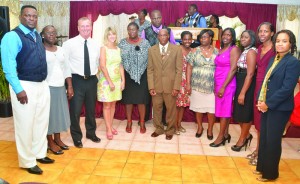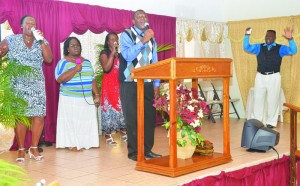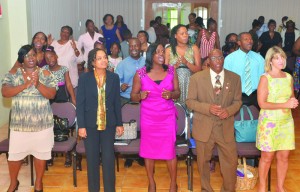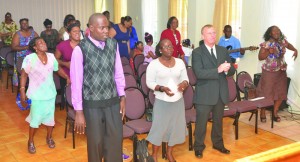


 Representatives from the Governor’s Office, the Gender Affairs Unit in the Ministry of Home Affairs, the Fire and Rescue Service, the Anguilla Community Action Network (ACAN) and the New Testament Church of God, met at a service on Sunday, January 26.
Representatives from the Governor’s Office, the Gender Affairs Unit in the Ministry of Home Affairs, the Fire and Rescue Service, the Anguilla Community Action Network (ACAN) and the New Testament Church of God, met at a service on Sunday, January 26.
The event, at the South Hill-based church, was the last of a series of meetings with four churches involved in Project Hope, an initiative funded by the Governor’s Office in cooperation with the ACAN and the National Aids Programme. The objective of the meetings was to sensitize the pastors and their congregations about an upcoming workshop at which church leaders are to consider ways of addressing stigma and discrimination relating to persons infected, and affected, by HIV/ADIS and other sexually-transmitted diseases.
The speakers were Mr John Lake, Director and CEO of ACAN; his assistant, Mrs Pamela Fleming; Mrs Vanessa Connor, youth representative of the Faith Based Organisation; Mr Jim Bunton, Adviser to the Fire and Rescue Services; Mrs Kim Cutler of the Governor’s Office; and Mrs Ronya Foy Connor, the newly-appointed Gender Development Coordinator.
Mrs Cutler was pleased with the large turnout. She observed that, unlike Jesus, it was not possible simply to touch someone and heal them of diseases like HIV/AIDS for example. She stressed that “what we can cure is the stigma and loneliness that they may face” by showing compassion to them. Mrs Cutler commended ACAN for its work and the churches for their involvement in the initiative.
Mr Bunton said that the Fire and Rescue Service had established an alliance with the Dominion Faith Centre and ACAN. “The alliance is intended to deal with fire safety in people’s homes where they are not able to do it themselves,” he stated. “To that end, we are going to visit churches and carry out demonstrations on what to do – and what not to do – in the event of a fire; and we are going to visit people’s homes and provide things like fire extinguishers and smoke alarms to try to keep them safe.” Persons who can afford the necessary pieces of equipment can purchase and install them on their own.
Mr Bunton indicated that similar to safeguarding against HIV/AIDS, and other sexually-transmitted diseases, there was also a need for persons to protect themselves from destructive fires.
Mrs Foy Connor said that HIV/AIDS and domestic violence were not often connected, but she showed that there was a connection in terms of rape, incest, molestation and other forms of sexual abuse through which victims can contract the HIV/AIDS virus. “In terms of HIV/AIDS and its connection to domestic violence, women are the largest percentage of all new HIV/AIDS cases, so the link between HIV/AIDS and violence is something that we need to begin talking about,” she stated. “We find that domestic violence becomes a problem when there is forced sexual interaction, and forced rape, because the persons being abused cannot protect themselves. They cannot request the abuser to wear a condom.”
The Gender Affairs Coordinator advised that the above matters needed serious attention by the churches in considering their role in the fight against HIV/AIDS and other sexual diseases. She indicated that, like those diseases, there was a stigma and a culture of silence attached to domestic violence which also needed to be addressed.
Pastor Bernard Joseph, who is the Chaplin for ACAN, commented that his church had joined in the fight against HIV/AIDS to achieve a healthier and prosperous foundation for Anguilla. He was pleased that the Faith Based Organisation and Project Hope were purpose-driven in their initiatives, and looked forward to their success.








